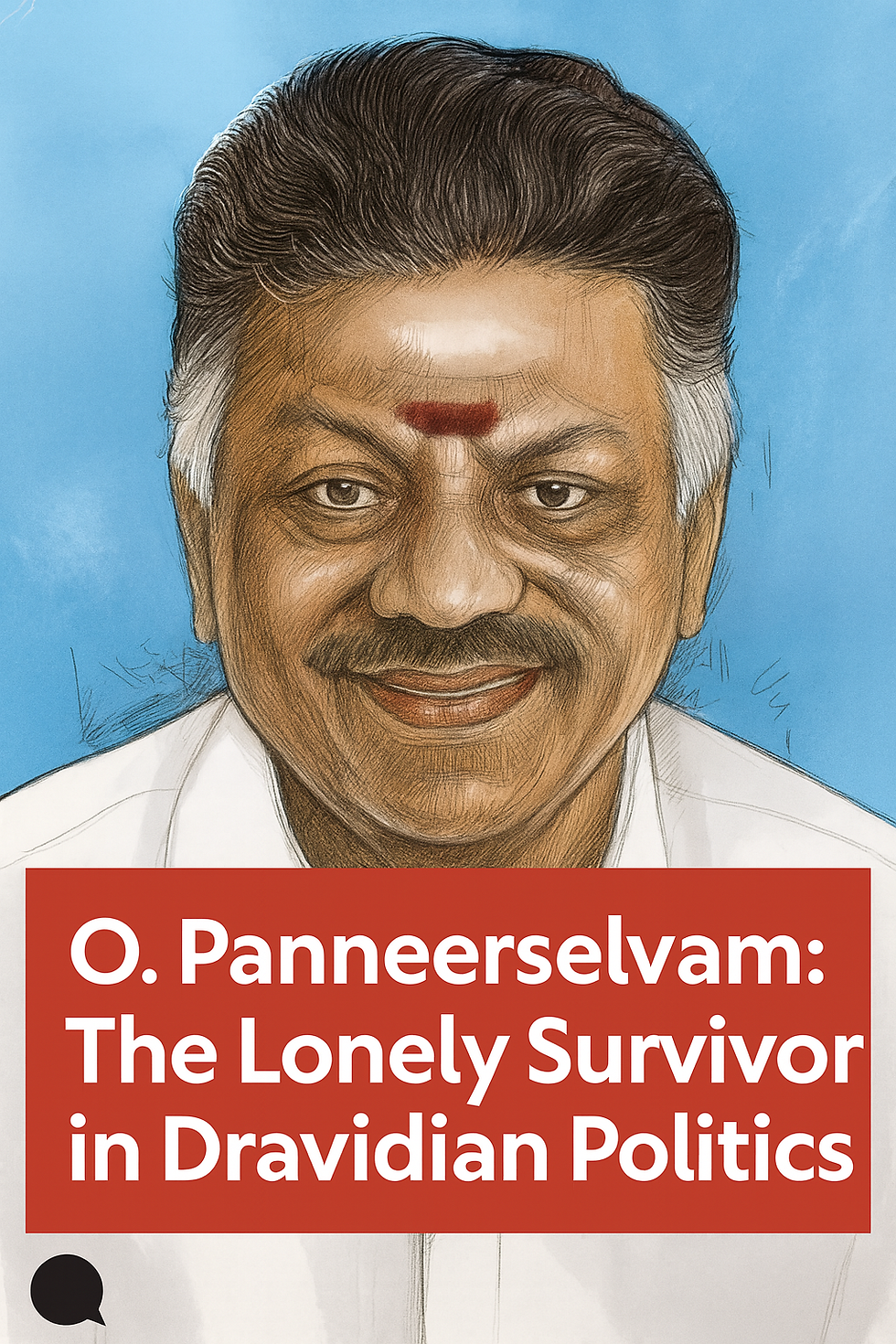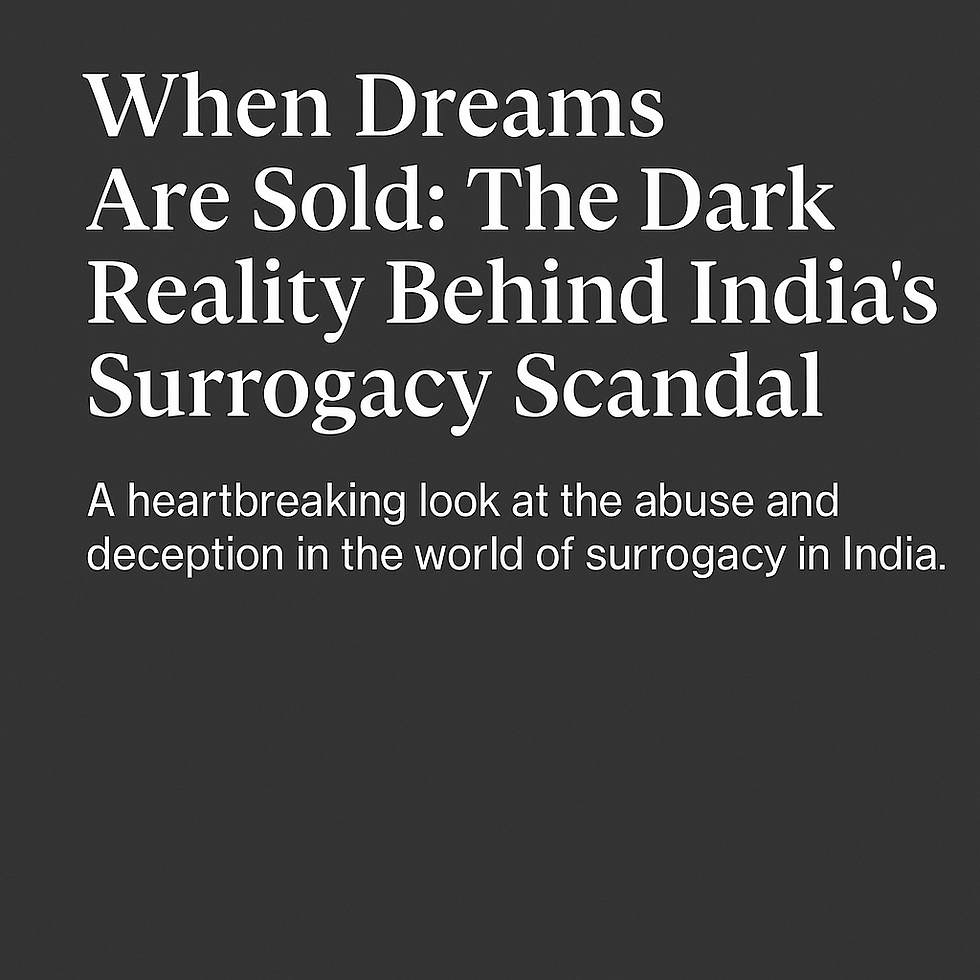Shibu Soren: The Guiding Spirit Behind Jharkhand’s Tribal Awakening
- Vivek Raj
- Aug 5, 2025
- 4 min read

"I have become shunya today..."With these heartfelt words, Jharkhand Chief Minister Hemant Soren mourned the loss of his father, Shibu Soren — a towering figure in tribal politics and a lifelong crusader for justice and identity.
The 81-year-old leader breathed his last in Delhi after a prolonged illness. Known to millions as Dishom Guruji, Shibu Soren leaves behind a legacy etched deeply into the soil, culture, and political consciousness of Jharkhand.
From Reform to Resistance: The Early Years
Long before electoral politics became his platform, Shibu Soren had already etched his name as a grassroots reformer. Born on January 11, 1944, in Nemra village (now in Jharkhand’s Ramgarh district), he belonged to the Santhal community — one of the largest tribal groups in eastern India.
His early activism, dating back to 1962, targeted exploitative moneylenders in tribal regions. At the height of their dominance, these lenders often took away two-thirds of the harvest, leaving tribal farmers in destitution. In a bold act of defiance, Soren led a movement encouraging villagers to reclaim their own produce. Armed with bows and arrows, the men stood guard while women harvested paddy from lands seized by creditors. It wasn’t just an act of protest — it was the birth of a movement.
During this period, he also earned the affectionate title "Guruji" for organising night classes for children who couldn't access formal education. To his people, he wasn’t just a leader; he was a mentor, protector, and guide.
Founding the Voice of Jharkhand
In the early 1970s, separate tribal movements were operating in isolation. Recognising the need for unity, Soren collaborated with leaders A.K. Roy and Vinod Bihari Mahto. On February 4, 1972, they decided to merge their efforts, leading to the formation of the Jharkhand Mukti Morcha (JMM). While Mahto became the first president, Soren took charge as general secretary. After the tragic death of Nirmal Mahato in 1987, Soren rose to lead the party.
Under his leadership, JMM became a powerful force advocating for a separate Jharkhand state. The party gave a political voice to decades of tribal struggles — around land rights, exploitation, and identity.
When the state of Jharkhand was finally carved out of Bihar in 2000, it was widely seen as a culmination of Soren’s long-standing efforts. He had transformed a regional dream into a political reality.
The Revolutionary Spirit
Shibu Soren’s influence extended beyond electoral victories or leadership titles. As a tribal icon, he helped unify communities across Jharkhand, Odisha, and West Bengal under a common banner of resistance. His methods were rooted in mass mobilisation, direct action, and constant dialogue with the marginalised. He became the symbol of a larger movement — one that sought to dismantle oppressive systems and create space for tribal voices in India’s democracy.
“He gave voice to the voiceless — from forests to the floor of the Assembly,” said JMM leaders who worked closely with him. His was a leadership born not in corridors of power but on village paths and protest grounds.
Political Highs and Controversies
Over his career, Soren served as Chief Minister of Jharkhand three times and as Union Coal Minister under the UPA regime. However, he never completed a full term in any of these roles due to shifting political alliances and turbulent state politics.
His name was also linked to the JMM bribery scandal of 1993, in which several party MPs were accused of accepting money to support the P.V. Narasimha Rao government in a no-confidence motion. Though these events cast a shadow over his career, they did not diminish his stature among the tribal masses.
A Farewell from the Nation
The news of Shibu Soren’s passing led to a cascade of condolences from across India. President Droupadi Murmu, Prime Minister Narendra Modi, and leaders from various parties — including Rahul Gandhi, Mallikarjun Kharge, Nitish Kumar, and Babulal Marandi — paid their respects.
President Murmu called him a lifelong advocate for social justice, while PM Modi described him as a “grassroots leader dedicated to tribal empowerment.” Opposition leaders echoed similar sentiments, recognising his contribution to statehood and tribal rights.
The Final Journey
The state of Jharkhand declared three days of mourning (August 4–6), and his last rites were scheduled to be held in his birthplace, Nemra village. He is survived by his wife Rupi Soren, sons Hemant and Basant, and daughter Anjali.
Earlier this year, due to declining health, he had stepped down from the top post of the JMM, handing over responsibilities to Hemant Soren, ensuring the continuity of his legacy.
Remembering Guruji
Shibu Soren’s life was marked by struggle, resilience, and transformation. Whether it was challenging feudal structures, advocating land rights, or fighting for a separate state, he remained true to his cause.
His political legacy is not defined solely by office or controversy but by the change he brought to the lives of tribal communities — people who had long remained at the margins of mainstream governance.
As the tribal drums fall silent and the bows are lowered, Jharkhand bids farewell to the man who shaped its identity. Guruji is no more — but his spirit echoes in every forest, every village, and every dream of justice.



Comments